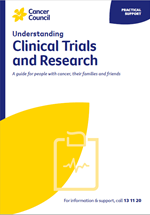- Home
- Cancer Information
- Cancer treatment
- Clinical trials and research
- Joining a trial or study
Joining a trial or study
This section explains how to find out about a clinical trial or other research study and what happens once you decide to participate.
Learn more about:
- Finding a trial or study
- Deciding to take part
- Who can join a study?
- Informed consent
- Your role in a trial or study
- Continuing the treatment
- Withdrawing from a study
- Finding trial results
Finding a trial or study
There are many ways to find out about clinical trials and other research studies. Most cancer specialists know about current studies and may recommend you join a suitable study, or you can ask them if there are any trials you can consider. If your hospital has a clinical trials or research nurse, you can also ask them about current studies. You don’t have to join a study at your current treatment centre – your doctor can refer you to a suitable trial at another centre.
Hospital and treatment centre waiting rooms often have information about current studies, or you might hear about a study through patient support groups, in the general media or through social media (such as Facebook). Before providing any personal information, especially via social media, check the study with your doctors.
You can also search clinical trials websites. If there isn’t a suitable study available right now, you can register through websites such as register4.org.au and www.cart-wheel.org, and they will tell you about any studies that come up in the future.
If you find a trial or study you’re interested in joining, discuss it with your cancer specialist. You can ask them if you meet the eligibility criteria and, if so, whether they could coordinate your involvement or put you in touch with the research team.
When I was diagnosed with cancer, a friend told me about the study. Getting involved was simple. Participating in cancer research is about giving to other people, and I think that’s a very valuable thing.
Phillipa
Video: What is a clinical trial?
In this video, Medical Oncologist Dr Elizabeth Hovey explains what clinical trials are and how they can improve cancer treatment.
Podcast: Making Treatment Decisions
Listen now
More resources
A/Prof Brett Hughes, Senior Staff Specialist, Medical Oncology, Royal Brisbane and Women’s Hospital and The Prince Charles Hospital, and Associate Professor, The University of Queensland, QLD; Christie Allan, Clinical Trials Lead, Cancer Council Victoria, VIC; Dawn Bedwell, 13 11 20 Consultant, Cancer Council Queensland, QLD; Joanne Benhamu, Senior Research Nurse, Team Lead, Lung, Colorectal and Palliative Care Trials, Parkville Cancer Clinical Trials Unit, Peter MacCallum Cancer Centre, VIC; Louise Dillon, Consumer; Sabina Jelinek, Clinical Nurse Research, St John of God Murdoch Hospital, WA; Chloe Jennett, Program Coodinator, Cancer Research, Cancer Council NSW; Carmel McCarthy, Consumer; Alison Richards, Research Unit Manager, Medical Oncology Clinical Trials Unit, Flinders Medical Centre, SA; Prof Jane Ussher, Translational Health Research Institute (THRI), School of Medicine, Western Sydney University, NSW; Prof Janette Vardy, Medical Oncologist, Concord Cancer Centre, and Professor of Cancer Medicine, The University of Sydney, NSW.
View the Cancer Council NSW editorial policy.
View all publications or call 13 11 20 for free printed copies.
Need to talk?
Support services
Coping with cancer?
Speak to a health professional or to someone who has been there, or find a support group or forum
Looking for transport, accommodation or home help?
Practical advice and support during and after treatment
Cancer information
Cancer treatments
Learn about common cancer treatments, such as surgery, chemotherapy and radiation therapy
View our publications
Guides and fact sheets for people with cancer, their families and friends


